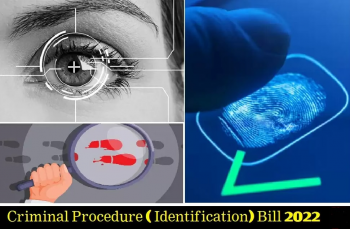
.png) Joseph Maliakan
Joseph Maliakan

Though India became independent in 1947, our statute books are still full of laws that the British enacted from time to time to suppress and oppress us. The Identification of Prisoners Act 1920 is one of several such laws. But instead of repealing the Act, the Lok Sabha on 4th April passed the Criminal Procedure (Identification) Bill 2022 to replace it. The Rajya Sabha passed it two days later.
The Parliament passed the Bill by voice vote in spite of the fact that the entire Opposition demanded that it be referred to a Parliamentary Standing Committee or a select committee for scrutiny. The new Bill does not merely replace the 102-year-old Act. It has been made more stringent in violation of the fundamental rights guaranteed by the Constitution of India. It is also contrary to the principles of data minimization and storage limitation laid down in the Puttuswamy and Aadhar judgements of the Supreme Court of India.
The Bill violates Article 20 of the Constitution -- prohibition against self-incrimination: No person accused of any offence shall be compelled to be a witness against himself. It violates the principle of natural justice treating every arrested person as guilty even before trial or conviction.
It gives unbridled powers to the police and prison officials to gather every detail -- physical, biological and social including what one eats, drinks and wears -- about the individual arrested or detained for any reason. According to clause 26, measurements include “finger prints, palm print impressions, photographs, iris and retina scan, physical and biological samples and their analysis, behavioural attributes including signatures, handwriting or any other examination referred to in section 53 or section 53 A of the Code of Criminal Procedure 1973.”
Those who refuse to give these details will be proceeded against under section 186 of the Indian Penal Code, obstructing public servant in discharge of public functions. In other words, once a person is arrested or detained, he or she has no escape from the long arm of the draconian enactment.
Under the 1920 British Act, only very limited data could be collected that too on the orders of a magistrate and data collection could be carried out only by police officials of the rank of sub-inspector and above. The magistrate also had to specify what data is to be collected. However, in the Bill passed by Lok Sabha, the magistrate has no role whatsoever and data collection has been handed over to head constables and prison warders.
In this context, the Law Commission, in 1980, had suggested that the 1920 Act be amended to require the magistrate to record the reasons for giving the order to collect data. The Bill does not have any such safeguard, on the contrary it gives wide powers to the head constables and prison warders.
Under the 2022 Bill, data of the following categories of people can be collected. Any person who has been: a) convicted of an offence punishable under any law for the time being in force; b) persons detained under any preventive detention law; and c) on the order of Magistrate, from any person (not just an arrested person) to aid investigation.
What takes the cake in the new Bill is the provision that the data collected will be stored with the Crime Records Bureau for 75 years, practically for the entire life of the individual whose data has been collected.
The following example will help to illustrate the impact of this provision. A person is found guilty of rash and negligent driving (and fined Rs 1,000). He may have his signature collected and stored in a central database for 75 years. May be in celebration of 75 years of India’s independence, under the new Bill data of the arrested, detained or convicted individuals could be preserved for 75 years!
Whether the Bill is constitutional or not has to be examined from the angle of the States’ powers. Law and order, police and crime investigation come under the State list. The British Government in India was free to make arbitrary decisions. Can the Union Government legislate on subjects reserved for the States even without consulting them?
In this context, what Dayanidhi Maran (DMK) said in Parliament is quite relevant. The Bill, he said, is anti-people and against the spirit of federalism. The Bill, he added, is open-ended and infringes on the privacy of individuals. He also accused the government of establishing a surveillance state.
Mounting severe criticism against the Bill, senior Congress leader and former Union Home Minister, P Chidambaram, called it unconstitutional, illegal and in direct contravention of the judgments of the Supreme Court. “If we can wait 102 years to change a Bill of 1920, why can’t we wait for 102 days for the Bill to be brought after examination by the standing committee?” he asked.